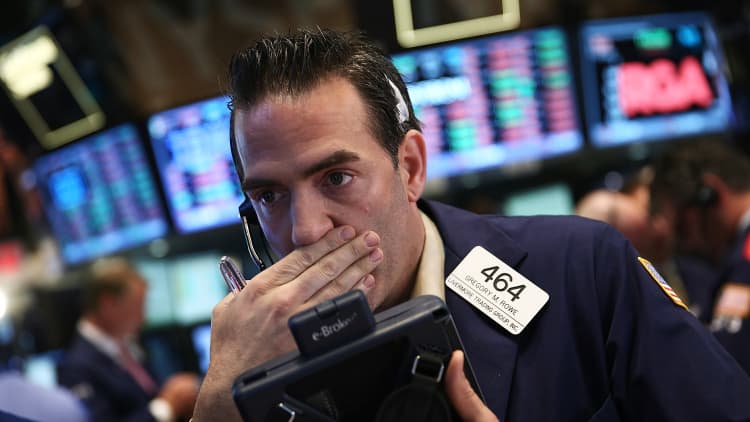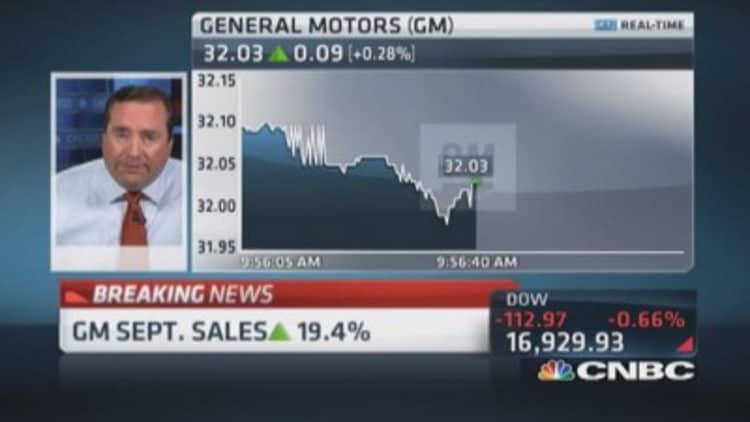
U.S. stocks declined sharply on Wednesday, with the fourth quarter starting off on a dour note after the S&P 500's seventh quarterly gain, as investors fretted global concerns, mixed U.S. economic data and earnings ahead.
Benchmark indexes posted their worst beginning to October since 2011 as investors sought safety in U.S. Treasury bonds and gold,with the CBOE Volatility Index, a measure of investor uncertainty, rising. The Russell 2000 fell into correction territory, down 10 percent from its July record.
"In the here and now, there are too many global-macro concerns for investors to have confidence," said Art Hogan, chief market strategist at Wunderlich Securities, listing worries about ISIS, Ukraine and Russia, the slowdown in China "and ebola, which is causing things like airline stocks to go down."
Read MoreFear factors that are crushing stocks
"As we sit on the eve of earnings season, and we had a bunch of weaker economic data today, and as you look at continued weakness in Europe, there is concern of does it bleed into earnings. It raises some doubt for investors as to what the earnings picture will look like," said Jim Dunigan, managing executive, investments, at PNC Wealth Management.
"October is a ghostly month anyway," Dunigan added.
Read MoreOctober off to its worst start in three years
"It's hard to get constructive with headlines of airstrikes in different parts of the world, so there are some doubts about what the economic environment looks like, particularly as we end the asset-purchase program," said PNC's Dunigan, referring to the Federal Reserve's bond buys, which are on track to conclude later this month.
Biotech companies involved in developing Ebola drugs rose, with Tekmira Pharmaceuticals and Sarepta Therapeutics among those rallying. Carriers including Delta Air Lines and JetBlue Airways fell on worries the disease might curb air travel. EBay slid after JPMorgan Chase and Jefferies Group downgraded shares of the online auctioneer.
"Will somebody decide not to go to Dallas? Maybe. I don't see that as a lasting situation," said Dunigan of the U.S. city where the first confirmed U.S. case of Ebola is hospitalized.
The Institute for Supply Management reported its manufacturing index hit 56.6 last month.
A separate report had construction spending dipping 0.8 percent in August.
"At least for today the economic data are a mixed bag; ISM manufacturing and spending could be characterized as weaker than expected," said Hogan.
U.S. private employers created 213,000 jobs last month, with the ADP National Employment Report roughly in line with expectations and coming ahead of Friday's nonfarm payrolls for September.
Major U.S. Indexes
After a 266-point drop, the Dow Jones Industrial Average fell 238.19 points, or 1.4 percent, to 16,804.71, with Intel leading blue-chip losses that extended to all but one of 30 components.
The lost 26.13 points, or 1.3 percent, to 1,946.16, with materials knocked the hardest and utilities the sole sector of 10 major industry groups to retain a positive footing.
The Nasdaq dropped 71.30 points, or 1.5 percent, to 4,422.09.
For every share rising, roughly three declined on the New York Stock Exchange, where 865 million shares traded. Composite volume neared 4.2 billion.
The dollar advanced against other global currencies and the yield on the 10-year Treasury note fell 10 basis points to 2.387 percent.
Crude-oil futures for November delivery reversed course to settle down 43 cents at $90.73 a barrel; gold futures for December delivery rose $3.90 to $1,215.50 an ounce on the New York Mercantile Exchange.
On Tuesday, U.S. stocks fell, with equities posting September losses and quarterly gains, as portfolio managers engaged in end-of-quarter positioning.
"There's obviously been a fairly quick reversal in terms of sentiment, a lot of people are pointing to ebola, a slight weakening in data, the decline in energy. You could find 100 reasons for it. What drives stock prices is earnings, and the ultimate path for stocks is higher," said Dan Greenhaus, chief global strategist at BTIG.

Coming Up This Week:
Thursday
Earnings: Constellation Brands, McCormick, Actuant, Global Payments
8:30 a.m.: Initial claims
10:00 a.m.: Factory orders
Friday
8:30 a.m.: Employment report
8:30 a.m.: International trade
10:00 a.m.: ISM nonmanufacturing
More From CNBC.com:


